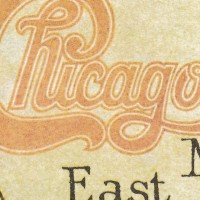Chicago 17, released on May 14, 1984, represented the group’s commercial pinnacle — and not just with David Foster, who produced three straight albums for the band in the 1980s. Chicago has never had a bigger-selling album than 17, nor one that spawned more Top 10 hit singles.
Foster’s arrival in the 1980s followed a series of disappointments: Before then, Chicago had not had a platinum album since 1978. David Foster not only modernized their sound, he helped the group — and the soon-to-depart frontman Peter Cetera — find previously unimagined success. They didn’t sell millions, they sold multi-millions.
“Look, a lot of people thought we were finished, including some people in the band,” founding drummer Danny Seraphine tells us, in an exclusive Something Else! Sitdown. “We proved everybody wrong, and came back bigger than ever. Chicago 17 was the biggest album we ever had. The early stuff with Chicago was the stuff I was known for, more so than the latter albums. But those songs were crafted beautifully, too, and Peter sang them really well. Those are some really good songs.”
It didn’t have a No. 1 single, like the previous 16, but “Hard Habit to Break” and “You’re the Inspiration” both went to No. 3. “Stay the Night,” with one of Chicago’s better videos, went to No. 16. “Along Comes a Woman” reached No. 14.
“Hard Habit” also signalled the emergence of a second voice in Chicago, as the R&B-soaked singer-keyboardist Bill Champlin shared vocals with Cetera. Chaplin, a long-time studio vet who arrived having already co-composed a pair of Grammy-winning songs in “After The Love Has Gone” and “Turn Your Love Around,” would move into a more prominent role with the band in Cetera’s absence — eventually helping them to another charttopper in “Look Away.”
By then, however, Chicago was receiving heavy criticism for trying to copy Foster’s formula for success. Cetera left in 1985, with Danny Seraphine following in 1990; Champlin split with Chicago in 2009.
“David Foster and I joined just as Cetera came into his own,” Bill Champlin tells us. “What I added was some underground stuff, something a little more dangerous. I sang a bunch of B sections on Chicago 17. Humberto (Gatica, Foster’s longtime engineer) asked me to do them, and I got one pass each. But I’ve been singing for my supper for a long time; I know what I am doing. So, it was pretty simple. Now that wasn’t necessarily what was called for at the end. What they wanted by then was a good Xerox copy of everything else Chicago had done. It’s like you were always saying: ‘Wow, we really had something back in the day.’ But why copy? Remember what you felt like, and keep going.”
Chicago may have replicated the sounds of Chicago 17 elsewhere, but they were never able to match its six-times platinum success in the U.S. The Foster-helmed 16 had gone double platinum in 1982, while 1986’s 18 — Chicago’s final project with him — sold a million copies. Sales for Chicago 17 outstripped even a pair of greatest-hits compilations released in 1975 and 1989.
That said, many long-time fans never clicked with the group’s updated aesthetic. The Grammy-nominated “Hard Habit to Break” — silky smooth, keyboard- and string-laden, largely horns-free — encapsulates everything they despised about this period.
Danny Seraphine, who introduced Chicago to the hitmaking producer, ironically found his own role in the band’s sound becoming less prominent with the advent of computerized rhythms. Still, Seraphine remains a staunch defender of the music the band made back then.
“David Foster really tried to maintain the integrity of the band,” Danny Seraphine tells us. “He wasn’t looking to diminish the musicality and the integrity of the band at all. Some people might say that he did. But he was going with what the times dictated. I’m telling you, there was word through our manager from radio stations saying they didn’t want anything with horns on it. How do you deal with that? Should we have stuck by our guns? I don’t know.”
- Nick DeRiso’s Best of 2015 (Rock + Pop): Death Cab for Cutie, Joe Jackson, Toto + Others - January 18, 2016
- Nick DeRiso’s Best of 2015 (Blues, Jazz + R&B): Boz Scaggs, Gavin Harrison, Alabama Shakes - January 10, 2016
- Nick DeRiso’s Best of 2015 (Reissues + Live): John Oates, Led Zeppelin, Yes, Faces + others - January 7, 2016



Chicago 80’s may have been a big comeback for the band, but they still produced the most soulless music of their career.
Bullshit. It was some the greatest music made in the decade of the 80’s. Get a clue.
I still listen to Chicago 17 more probably than any other album I own. The way they brought the strings in, especially on “Remember the Feeling,” made for an amazing album.
I just wish they hadnt forced Cetera’s hand and caused him to leave the band. I would have loved to have seen more albums with that killer Cetera/Champlin/Foster combo.
I could care less about Cetera ever doing anything with Chicago ever again. But get him, Champlin, and Foster in a recording studio again or on a stage and I’ll be first in line.